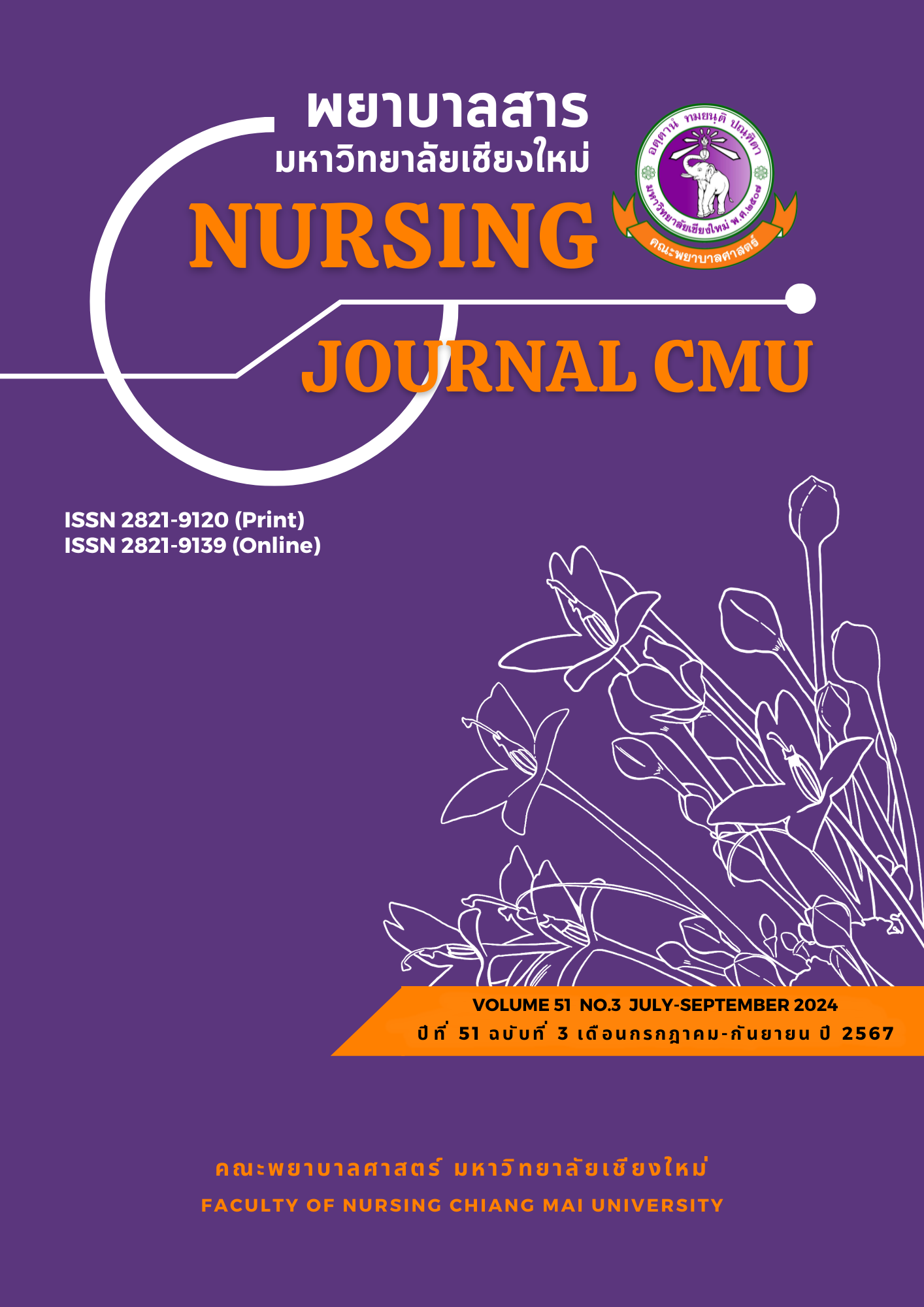Resilience and Associated Factors Among Adolescents with Congenital Heart Disease Receiving Services at King Chulalongkorn Memorial Hospital
Keywords:
Resilience, Adolescents, Congenital heart disease (CHD), DepressionAbstract
Currently, medical science in the treatment of congenital heart diseases (CHD) has made significant advancements. However, adolescents with CHD must adjust their lifestyles and face several health-related obstacles, which may lead to mental health issues such as depression and anxiety. Resilience can enable them to confront and manage stressful situations. The 73 participants were adolescent patients with CHD attending the Pediatric Outpatient Clinic of King Chulalongkorn Memorial Hospital, and aged 13-18 years. The tools used for data collection included: 1) a personal information; 2) an assessment of friendship intimacy; 3) the Resilience scale (Thai version); and 4) the Patient Health Questionnaire for Adolescents (Thai version). The data was analyzed using descriptive statistics, Chi-square statistics, and Pearson correlation.
The research findings were as follows. The sample group had average resilience scores at a moderate level (Mean = 20.22, SD = 4.47). Most of the participants, 58 adolescents (79.45%), showed a moderate level of resilience, 11(15.07%) showed a low level; and 4 (5.48%) showed a high level. The marital status of parents and friend intimacy showed a statistically significant correlation with resilience (p < 0.05 and p < 0.05, respectively). Congenital heart disease-related factors and depression showed a non-significant association with resilience.
The results of this research can serve as baseline data on resilience levels in adolescents with CHD. In addition, they can guide the development of mental health care strategies by supporting family and friends' involvement in adolescent care.
References
Amin, K., & Patel, K. (2022). Role of psychologists in pediatric congenital heart disease. Pediatric Clinics of North America, 69(5), 865-878. https://doi.org/10.1016/j.pcl.2022.05.002
Ananpatiwet, S., Waeokrathok, N., & Kanngoolearm, S. (2022). Relationship between resilience, friendship intimacy, and depression of secondary school students in Nakhon Ratchasima Province. APHEIT Journal of Nursing and Health, 4(3), 1-16.
Drakouli, M., Petsios, K., Giannakopoulou, M., Patiraki, E., Voutoufianaki, I., & Matziou, V. (2015). Determinants of quality of life in children and adolescents with CHD: A systematic review. Cardiology in the Young, 25(6), 1027-1036. https://doi.org/10.1017/s1047951115000086
Glenn, T., Cousino, M. K., Wernovsky, G., & Schuchardt, E. L. (2023). Resilient hearts: Measuring resiliency in young people with congenital heart disease. Journal of the American Heart Association, 12(21), e029847. https://doi.org/10.1161/jaha.123.029847
Gonzalez, V. J., Kimbro, R. T., Cutitta, K. E., Shabosky, J. C., Bilal, M. F., Penny, D. J., & Lopez, K. N. (2021). Mental health disorders in children with congenital heart disease. Pediatrics, 147(2), e20201693. https://doi.org/10.1542/peds.2020-1693
Greup, S. R., Kaal, S. E. J., Jansen, R., Manten-Horst, E., Thong, M. S. Y., van der Graaf, W. T. A., Prins, J. B., & Husson, O. (2018). Post-traumatic growth and resilience in adolescent and young adult cancer patients: An overview. Journal of Adolescent and Young Adult Oncology, 7(1), 1-14. https://doi.org/10.1089/jayao.2017.0040
Grotberg, E. (1995). A guide to promoting resilience in children: Strengthening the human spirit. The Bernard Van Leer Foundation.
Kim, M., Kim, K., & Kim, J. S. (2019). Impact of resilience on the health-related quality of life of adolescents with a chronic health problem: A structural equation approach: Resilience and health-related quality of life of adolescents. Journal of Advanced Nursing, 75(4), 801-811. https://doi.org/10.1111/jan.13888
Lee, S., Kim, S., & Choi, J. Y. (2014). Coping and resilience of adolescents with congenital heart disease. Journal of Cardiovascular Nursing, 29(4), 340-346. https://doi.org/10.1097/JCN.0b013e3182865367
Lee, S., Lee, J., & Choi, J. Y. (2017). The effect of a resilience improvement program for adolescents with complex congenital heart disease. European Journal of Cardiovascular Nursing, 16(4), 290–298. https://doi.org/10.1177/1474515116659836
Llistosella, M., Castellvi, P., Limonero, J. T., Pérez-Ventana Ortiz, C., Baeza-Velasco, C., & Gutiérrez-Rosado, T. (2022). Development of the individual and environmental resilience model among children, adolescents and young adults using the empirical evidence: An integrative systematic review. Health & Social Care in the Community, 30(6), e3277-e3299. https://doi.org/10.1111/hsc.13899
Monti, J. D., Jackson, J. L., & Vannatta, K. (2018). Adolescents and young adults living with congenital heart disease: Coping, stress reactivity, and emotional functioning. Journal of Clinical Psychology in Medical Settings, 25(4), 441-451. https://doi.org/10.1007/s10880-018-9554-y
Moon, J. R., Song, J., Huh, J., Kang, I. S., Park, S. W., Chang, S. A., Yang, J. H., & Jun, T. G. (2017). The relationship between parental rearing behavior, resilience, and depressive symptoms in adolescents with congenital heart disease. Frontiers in Cardiovascular Medicine, 4, 55. https://doi.org/10.3389/fcvm.2017.00055
Nateethan, M. (2003). Factors influencing depression of adolescents in Muang Distrinct Chiang Mai Provience [Master’s thesis, Chiang Mai University]. http://cmuir.cmu.ac.th/handle/6653943832/30245
Panyawong, W., Pavasuthipaisit, C., & Santitadakul, R. (2018). Development of the Thai version of the patient health questionnaire for adolescents; PHQ-A. https://dmh-elibrary.org/items/show/395
Panyawong, W., Pavasuthipaisit, C., & Santitadakul, R. (2020). Validation of the Thai version of the patient health questionnaire for adolescents (PHQ-A) in adolescent psychiatric patients. International Journal of Child Development and Mental Health, 8(1), 30-40.
Ruetathip, N., Rujirachakorn, S., Mariamman, I., & Chanpeng, B. (2020). Strong together (D. o. M. Health, Ed. Vol. 1). Beyond Publishing.
Somkittikanon, P., & Bunyapipat, T. (2021). The study of resilience quotient of the secondary private school students in Bangkok. Journal of Health and Health Management, 7(1), 28-36. https://he01.tci-thaijo.org/index.php/slc/article/view/249069
van Harmelen, A. L., Kievit, R. A., Ioannidis, K., Neufeld, S., Jones, P. B., Bullmore, E., Dolan, R., NSPN Consortium., Fonagy, P., & Goodyer, I. (2017). Adolescent friendships predict later resilient functioning across psychosocial domains in a healthy community cohort. Psychological Medicine, 47(13), 2312-2322. https://doi.org/10.1017/s0033291717000836
Wang, Q., Hay, M., Clarke, D., & Menahem, S. (2012). The prevalence and predictors of anxiety and depression in adolescents with heart disease. The Journal of Pediatrics, 161(5), 943-946. https://doi.org/10.1016/j.jpeds.2012.04.010
Downloads
Published
How to Cite
Issue
Section
License
Copyright (c) 2024 Nursing Journal CMU

This work is licensed under a Creative Commons Attribution-NonCommercial-NoDerivatives 4.0 International License.
บทความที่ได้รับการตีพิมพ์เป็นลิขสิทธิ์ของวารสารพยาบาลสาร
ข้อความที่ปรากฏในบทความแต่ละเรื่องในวารสารวิชาการเล่มนี้เป็นความคิดเห็นส่วนตัวของผู้เขียนแต่ละท่านไม่เกี่ยวข้องกับมหาวิทยาลัยเชียงใหม่ และคณาจารย์ท่านอื่นๆในมหาวิทยาลัยฯ แต่อย่างใด ความรับผิดชอบองค์ประกอบทั้งหมดของบทความแต่ละเรื่องเป็นของผู้เขียนแต่ละท่าน หากมีความผิดพลาดใด ๆ ผู้เขียนแต่ละท่านจะรับผิดชอบบทความของตนเองแต่ผู้เดียว






